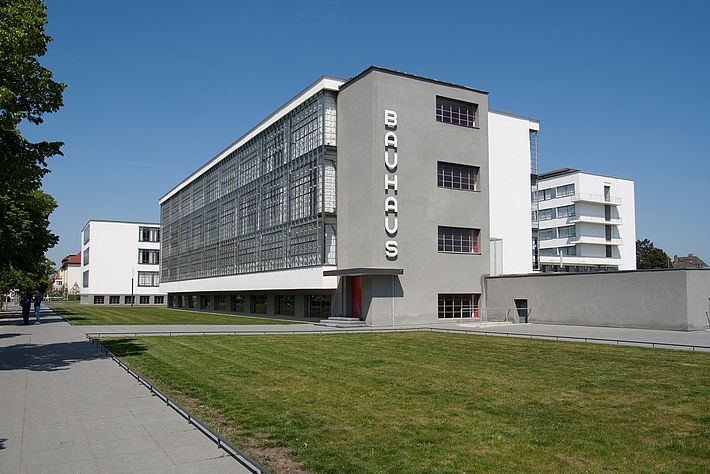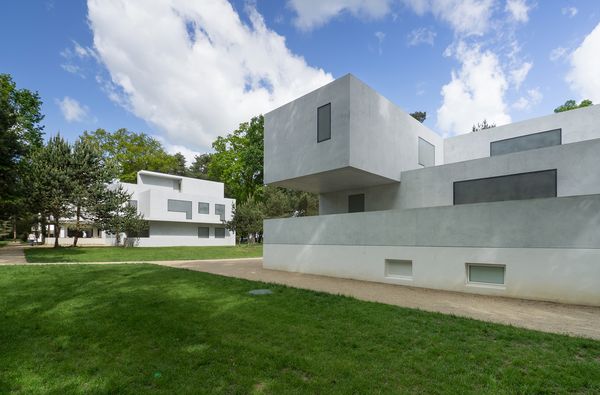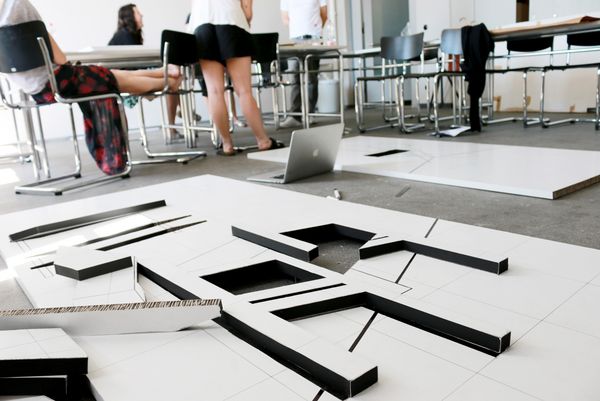Bauhaus Dessau Foundation
The Bauhaus Dessau Foundation hosts the Bauhaus as a venue of science and the arts, cultivating and presenting the Bauhaus' spiritual and architectural heritage in Dessau.

Headline
The Bauhaus experienced its heyday as a college of design in Dessau from 1925 to 1932. The liberal mood of departure in the city of Dessau offered Bauhaus students many opportunities for development at that time – as a university with progressive ideas about education, as a production site for serially manufactured product design, as an experimental setting for a new understanding of theatre and the stage, and of course, for architecture and living together as a group of artists.
Headline
Much from that time has been handed down to this day and can be seen in Dessau. The Bauhaus Building itself with its workshop wing, theatre and refectory, the Masters' Houses, the Dessau-Törten Housing Estate with the Konsum Building and the Houses with Balcony Access, as well as the Kornhaus and the Employment Office. Each of these buildings or housing units tells the story of a collective coexistence founded on a basic understanding of modern society that is still avant-garde today.
Since 1996, the Bauhaus and the Masters' Houses in Dessau have been UNESCO World Heritage sites. Every year, around 100,000 visitors visit these architectural icons of Classical Modernism.

Headline
The Bauhaus Dessau Foundation was founded in 1994. The artistic-scientific foundation – with headquarters in the Bauhaus building – works in an historically reflective manner while also enquiring about current relevance and potentials for the 21stcentury which can be derived from the Bauhaus' legacy. Thus, the Bauhaus workshop is dedicated to questions of contemporary design that arise from the challenges of urban development, mobility and perspectives of energy. Educational formats at the Bauhaus Academy are cross-disciplinary, aimed at designers, artists, architects, researchers, and students from all over the world. Residence programmes invite them to live and work at the Bauhaus over a longer period of time. Today, on a visit to the Bauhaus Building in Dessau you may encounter, for example, young Polish textile designers having lunch in the refectory and a dance ensemble from Seoul rehearsing in the Bauhaus auditorium.

Headline
The Foundation works with an annual thematic emphasis derived from historical themes, the current relevance of which is examined and questioned via exhibitions, symposia, publications, and the stage programme. A highlight of the foundation's programme is the traditional Bauhaus Festival, an artistic festival cooperating with many renowned art, design, and film schools.
Contact
Bauhaus Foundation Dessau
Gropiusallee 38
06846 Dessau-Roßlau
E-Mail
Bauhaus Agents Programme Dessau
Headline
With more than 40,000 exhibits, the Bauhaus Dessau Foundation has the second largest Bauhaus collection in the world – focussing on the history of the Bauhaus from 1919 to 1933, in particular the years in Dessau.
On the occasion of the Bauhaus anniversary, a new Bauhaus Museum is being built in Dessau, financed by the Federal Government and the State of Saxony-Anhalt. The office of González Hinz Zabala (addenda architects) from Barcelona, Spain, emerged as the winner of an open, international architectural competition in 2015. The Bauhaus Museum Dessau will be opened in 2019. In addition to presenting the collection, it will also provide an exhibition venue for contemporary standpoints relating to the Bauhaus.
As one of the three key collecting centres and a member of the Bauhaus Kooperation Berlin Dessau Weimar, the Bauhaus Dessau Foundation will stage, among other things, two major exhibitions to mark the anniversary, and will be jointly responsible for key events in the anniversary programme.